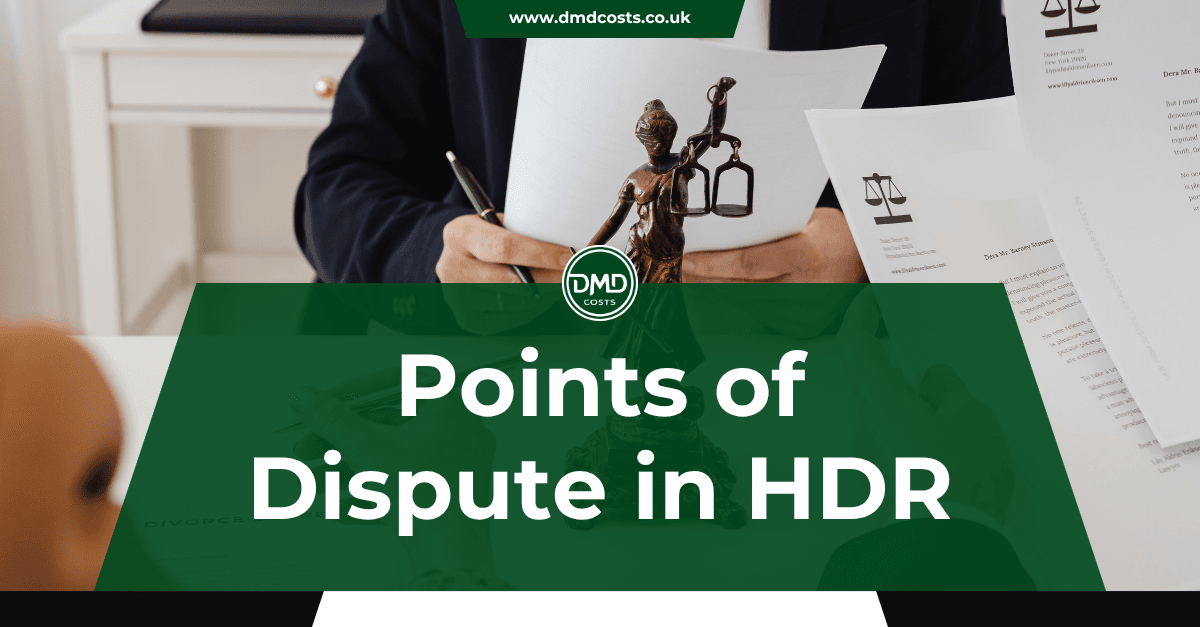

Answer in 2 sentences (snippet-bait):
Housing Disrepair Points of Dispute (PoDs) target rates, necessity/duplication, disbursements and proportionality. The strongest Replies tie each item to pleadings and orders, breach timelines (e.g., Awaab’s 24h/10-day duties where relevant), disclosure volume and outcome—conceding only low-yield admin to protect the overall figure.
________________________________________
• HDR currently sits outside FRC → costs are on the hourly basis (standard; indemnity where engaged).
• PoDs window is 21 days from service of N252 (or as extended); lateness risks a Default Costs Certificate (DCC).
• You can seek Payments on Account (CPR 44.2(8)) during negotiations.
• Typical HDR cuts: duplication, file-building/admin, tenant attendances, surveyor/expert prep, bundles, travel, grade uplifts.
• Best Replies: evidence necessity, link to orders/breach, isolate true admin, and offer model concessions that don’t touch strategic work.
________________________________________
Reply: Supervision/complexity justifies Grade C. Defendant denied liability; multiple hazards; expert coordination. Entries show analysis/strategy, not mechanical tasks. Grade D kept only for scanning/bundling (already separated).
Reply: Rate reflects local market plus risk/complexity (multi-defect damp/mould, repeat attendances, vulnerability). SCCO comparables and recent outcomes appended. Reasonable; no further reduction.
Reply: Roles split—solicitor handles strategy, caseworker fact-gathering. Joint attendances were necessary handovers at milestones (pre-issue, expert instruction, Part 36). Handover notes identify distinct tasks.
Reply: Pure admin already trimmed. Remaining work is strategy-linked (collating historic reports to plead multiple hazards; preparing a bespoke settlement bundle). Not mechanical; necessity shown in narrative.
Reply: Frequency driven by landlord non-compliance and access problems. Each attendance aligns to a milestone: report of hazard, 24h make-safe missed, 10-day investigation lapse, offers. Outcomes recorded.
Reply: Expert instruction was necessary (multiple damp sources, causation/quantum). Rate is market-reflective; work confined to inspection, report, Q&A. Voucher and scope letter provided.
Reply: Bundle was bespoke and outcome-critical (defect chronology, photo log, expert annexes). Page count noted; time proportionate to disclosure volume and needed clarity for settlement. Admin trimming applied.
Reply: Travel minimised; remote used where suitable. In-person attendances were necessary (inspection, access, safeguarding). Waiting stems from landlord/contractor delays; non-productive time reduced appropriately.
Reply: Offer steps were strategic and shortened litigation. Initial Calderbank; calibrated claimant Part 36 when liability settled; movement tied to expert findings. This approach reduced overall costs.
Reply: Correspondence covers distinct issues (access, repairs, compensation, vulnerability). Templates used for efficiency; entries reflect tailoring and strategy. Pure admin notices removed.
Reply: Workstreams are separated in narrative—damages/repairs vs costs. Costs work was necessary to resolve the bill; damages work essential to settlement. No double-counting.
Reply: On the standard basis, costs are proportionate to value, risk, complexity and outcome: multiple hazards, vulnerable tenant, expert involvement, compliance change. The achieved result (repairs + compensation) justifies the spend. No global haircut.
________________________________________
• Date/time the hazard was first reported.
• Whether 24 hours make-safe was missed (and consequences).
• Whether 10 working days investigation was missed or incomplete.
• The sequence of offers (Calderbank → Part 36) and why movement occurred.
• Latest orders/pleadings with any compliance directions.
• Attendance notes with purpose and outcome for each contact.
• Expert scope letter, report, Q&A, vouchers.
• Photo log with dates/locations.
• Offer ladder (and reasoning).
Concession micro-template
“Without prejudice to principle, we’ll reduce purely administrative entries (scanning/email filing) by X minutes. Strategy-linked work (expert coordination, offers, settlement bundle) is maintained as necessary and proportionate.”
________________________________________
• Payment on Account (CPR 44.2(8)): ask early with protective wording.
• Default Costs Certificate: if PoDs are late after 21 days (or the agreed extension), pursue DCC and keep a clean service log for any set-aside application.
• Part 36: serve once liability is steady to protect an indemnity period under 36.17 if beaten at judgment.
________________________________________
No. HDR is currently outside FRC, so recovery is on the hourly basis (standard or, where engaged, indemnity).
Yes—when necessary and evidenced with scope, vouchers, disclosure volume and outcome relevance.
Apply for a Default Costs Certificate and seek a Payment on Account in the meantime.
Describe value, risk, complexity and outcome; tie key work to breach or orders; isolate true admin while defending strategic time.
________________________________________
We’ll draft & negotiate your first HDR bill to settlement for free.
If you’re happy, it’s £500 all-in per file thereafter (drafting + negotiations + settlement paperwork). 5-day SLA.